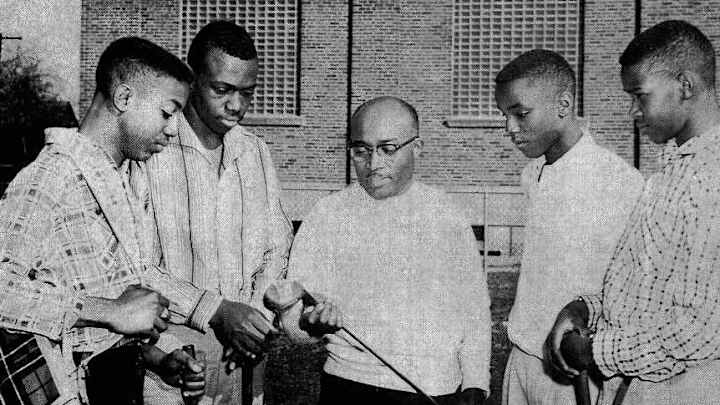George Roddy a University of Iowa Trailblazer

IOWA CITY, Iowa - During much of his University of Iowa golf career, the color of George Roddy’s skin was as newsworthy as the scores he shot.
“George Roddy, colored sophomore from Keokuk,” reported the Iowa City Press-Citizen on May 24, 1929.
“George Roddy of Keokuk, Negro star,” is how the Des Moines Register described him on May 30, 1930.
“George Roddy, Iowa’s colored golf star, came into his own at Finkbine Field Saturday,” said the Press-Citizen on May 11, 1930.
Roddy was a fine player, period. He was also a trailblazer. Roddy is the first African-American to play for the Iowa golf team, in the early 1930s. He was the first black team captain. And the sport’s first black letterman.
And now, seven decades after he graduated from the University of Iowa with a degree in engineering, Roddy’s achievements will be honored once again. He is one of seven members of the Iowa Athletics Hall of Fame Class of 2022. The university announced the honorees earlier this month.
Roddy will be enshrined on Sept. 2, along with Dallas Clark (football) Amy Fowler (field hockey), Dan Holm (wrestling), Kari Knopf (softball), Keith Noreen (baseball) and Nancilea Underwood (swimming and diving).
Roddy, who passed away in 1988 at 80 years of age, is an incredible story. When he decided to enroll at Iowa in the late 1920s, his family didn’t have the money for a bus ticket so he walked from Keokuk to Iowa City.
Coach Charles Kennett didn’t play Roddy in varsity meets as a sophomore in 1929, even though he had some impressive credentials. Roddy was medalist in the season-opening varsity-freshman meet. He also won the All-University Championship, beating teammate Marc Stewart in the finals, 2 and 1. Roddy collected both the Howard L. Beye Traveling Trophy and the Rudolph A. Kuever Cup for his victory.
When Roddy’s junior season kicked off, Kennett had him listed as the No. 1 man on his varsity squad heading into the opener against Grinnell.
“A star negro golfer from Keokuk, George Roddy, seems likely to head the attack against the Pioneers,” the Press-Citizen reported on April 15,1930.
Roddy retained the Beye Trophy and Kuever Cup by successfully defending his All-University Championship. Then both he and teammate Fred Agnew went undefeated during the regular season.
“George Roddy repeated his performance of a year before when he outplayed all competition to win out in the all-university tournament in the spring,” according to the University of Iowa’s Hawkeye Yearbook. “Roddy plays with a style that few teams could cope with and went through the season without once tasting defeat. In most cases he won his matches by quite comfortable margins.”
That season was shortened to four meets, the result of a football slush fund scandal involving Iowa’s football team. One of the penalties was that no Iowa varsity team could compete against Big Ten schools.
A Big Ten faculty committee lifted that ban on Feb. 2, 1930, when most of the spring schedules had already been completed. The golf team was able to add a May dual with Minnesota, and history was made.
Roddy shot a Finkbine-record 72, on nines of 31-41, as the Hawkeyes won. Roddy outdueled Minnesota’s William Fowler, who had won the North Dakota State Amateur title in 1927 and 1929.
Unfortunately, Roddy and Fowler didn’t get a chance to battle it out for the Big Ten Championship at Westmoreland Country Club in Wilmette, Ill. In fact, Kennett didn’t have either Roddy or Agnew available, for much different reasons. Roddy couldn’t play because Westmoreland Country Club didn’t allow blacks to play. Agnew missed because he had a conflict with senior law exams.
Jack Patton, sports editor of the Press-Citizen, wrote on May 17, 1930, that Roddy was “Iowa’s most serious threat in conference golf history.”
Without Roddy and Agnew, Kennett’s team was last in the team standings by 44 strokes after the first round and withdrew from the tournament.
Roddy was denied a third consecutive All-University title in 1931, losing in the semifinals. The highlight of his senior season came in a 10-8 victory over DePaul at Finkbine. Roddy was medalist with a 73 and the Hawkeyes handed DePaul its first loss in two seasons. Roddy had a hand in six of those 10 points with his victory in both singles and doubles matches.
Iowa won three of the five matches Roddy played in. The Hawkeyes lost dual meets at the University of Chicago and Northwestern after Roddy was banned from playing because the host clubs didn’t allow blacks.
In the final match of his career, Roddy led the Hawkeyes to an 11-7 victory over visiting Iowa State. The Big Ten Championship was contested at a club in Ann Arbor, Mich., that didn’t allow blacks to play. Kennett pulled his team from the competition.
When his career was finished, the Des Moines Register called Roddy “the best Iowa golfer of all time.”
A week after graduating from Iowa, Roddy came to Des Moines and won the inaugural Midwest Negro Tournament at Grandview. He also won the National Minority Amateur Championship in 1930 and 1937.
Roddy went on to become a successful educator and coach. He got his first job as an instructor and golf coach at Arkansas State College in 1931. From there he went to North Carolina A&T in 1933 and was head golf coach and an auto mechanics and mathematics teacher. He left in 1948 to become an industrial arts teacher at Crispus Attucks High School in Indianapolis, Ind. He also started the golf program there.
Roddy continued his fine play on the golf course, too, winning the Indianapolis City golf title in 1963 and 1967. His second title came when he was 57 years old. In 1999, Roddy became the first African-American elected to the Indiana Golf Hall of Fame.
Twenty-three years later, Roddy’s alma mater will enshrine him as a hall of famer once again. He will be right where he belongs, remembered as one of the school’s all-time greats.
